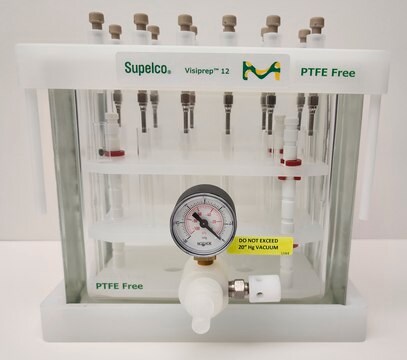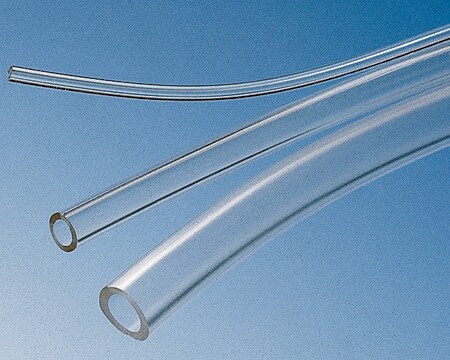Z685631
Tygon® formula 2375 laboratory tubing
I.D. × O.D. 4.8 mm × 8.0 mm, L 15 m (50 ft)
Synonym(s):
chemical resistant tubing, laboratory tubing, non-leaching tubing
Sign Into View Organizational & Contract Pricing
All Photos(1)
About This Item
UNSPSC Code:
41105108
NACRES:
NB.51
Recommended Products
packaging
pack of 50 feet
manufacturer/tradename
St. Gobain AJK00012
I.D. × O.D.
4.8 mm × 8.0 mm
L
15 m (50 ft)
wall thickness
1.6 mm
Looking for similar products? Visit Product Comparison Guide
General description
Tygon laboratory tubing, formula 2375, is chemically resistant tubing. Clear, flexible tubing suitable for specialty chemical production and hazardous material handling.
- Resistant to MEK, acids, bases, ketones, and alcohols
- Plasticizer free
- No contamination from leaching
- Biocompatible
- No disposal concerns
- Releases only carbon dioxide and water upon incineration
- Sterilize by gas or radiation
Specifications
Technical data:
Tensile Strength: 1900 psi (13.1 MPa)
Ultimate Elongation: 850%
Tensile Stress @ 100% elongation: 425 psi (2.9 MPa)
Tensile Set (@ 75% of ultimate elongation): 300%
Tear Resistance: 240 lb-f/inch (42 kN/m)
Compression Set Constant Deflection: 100% @ 158°F (70°C) for 22 hours
Brittle Temperature: < -75°F (<-59°C)
Low Temp. Flexibility: -103°F (-75°C)
Specific Gravity: 0.9
Water Absorption: 0.04% 24 hrs at 73°F (23°C)
Maximum Recommended Operating Temperature: 130°F
Color: Clear
Tensile Strength: 1900 psi (13.1 MPa)
Ultimate Elongation: 850%
Tensile Stress @ 100% elongation: 425 psi (2.9 MPa)
Tensile Set (@ 75% of ultimate elongation): 300%
Tear Resistance: 240 lb-f/inch (42 kN/m)
Compression Set Constant Deflection: 100% @ 158°F (70°C) for 22 hours
Brittle Temperature: < -75°F (<-59°C)
Low Temp. Flexibility: -103°F (-75°C)
Specific Gravity: 0.9
Water Absorption: 0.04% 24 hrs at 73°F (23°C)
Maximum Recommended Operating Temperature: 130°F
Color: Clear
Legal Information
Tygon is a registered trademark of Saint-Gobain Performance Plastics Corp.
Choose from one of the most recent versions:
Certificates of Analysis (COA)
Lot/Batch Number
It looks like we've run into a problem, but you can still download Certificates of Analysis from our Documents section.
If you need assistance, please contact Customer Support.
Already Own This Product?
Find documentation for the products that you have recently purchased in the Document Library.
Customers Also Viewed
Robert Morhard et al.
IEEE transactions on bio-medical engineering, 67(8), 2337-2348 (2019-12-17)
Ethanol ablation, the injection of ethanol to induce necrosis, was originally used to treat hepatocellular carcinoma, with survival rates comparable to surgery. However, efficacy is limited due to leakage into surrounding tissue. To reduce leakage, we previously reported incorporating ethyl
Our team of scientists has experience in all areas of research including Life Science, Material Science, Chemical Synthesis, Chromatography, Analytical and many others.
Contact Technical Service

